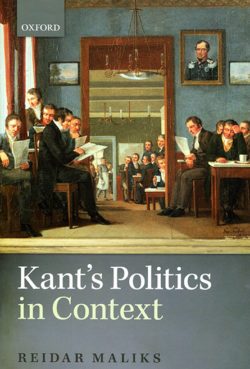Kant’s Politics in Context
Oxford University Press
This book analyses Kant’s political philosophy in the light of public controversies between conservative and radical observers of the French Revolution. The author argues that Kant’s theory of equal freedom explains his condemnation of both paternalistic government and radical democracy, and his defense of republican constitutionalism. That Kant idealized the public sphere is well known, but that he intentionally developed his own philosophy in public discourse has not been fully appreciated. Paying attention to these debates in German philosophy during the 1790s, and participants such as Fichte, Erhard, Bergk, Rehberg, and Gentz, can help us to understand Kant’s political philosophy. The first comprehensive account of Kant’s politics in context, this book provides a fresh perspective on both modern political philosophy at a foundational moment and on Kant’s central political concepts, including freedom, rights, citizenship, revolution, and war.


